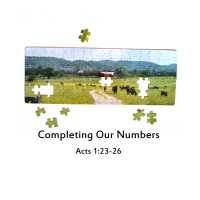Speaking in tongues is one of the most controversial, strange, and misunderstood concepts in the Bible. It has been the source of divisions in the Church, perhaps even more so than ideas surrounding baptism. Its various camps of belief form fierce adversaries whose behavior can seem anything but Spirit-filled by how they treat one another. But it doesn’t have to be that way.
Today’s passage, Acts 2:5-12, can help us to begin to make sense of “speaking in tongues.” Our passage actually gives us two clues for doing this.
W e’ve been working our way through the book of Acts and the Holy Spirit promised in the earliest verses of chapter 1 has arrived. The setting is Jerusalem during the Feast of Weeks, a harvest feast coinciding with the end of the barley harvest and the beginning of the wheat harvest. We know it as Pentecost…celebrated fifty days after the Passover.
e’ve been working our way through the book of Acts and the Holy Spirit promised in the earliest verses of chapter 1 has arrived. The setting is Jerusalem during the Feast of Weeks, a harvest feast coinciding with the end of the barley harvest and the beginning of the wheat harvest. We know it as Pentecost…celebrated fifty days after the Passover.
It is fitting that this should be the end of one harvest and the beginning of another, signaled by the coming of the Holy Spirit. It’s as if God is saying the type of harvest in the days prior to the Resurrection are concluded and the type of harvest during the days after the Resurrection will be something totally new.
Jews from all over the known world made a pilgrimage to Jerusalem for many of the feasts, including the one at Pentecost. Ethnic/religious Jews and Jewish converts came to honor God with their presence at the Temple during such times. “Up to Jerusalem” was how these pilgrims viewed their trek and some of these pious Jews—particularly elderly ones—would stay on at Jerusalem to live out their last days, hoping to be buried in the Holy Land.
Our passage Acts 2:5-12 begins: Acts 2:5 Now there were staying in Jerusalem God-fearing Jews from every nation under heaven.
This is probably referring to the known world of that day, but the point is they were God-fearers (as distinct from disciples of Jesus). These God-fearers came from many nations–nations in which different languages were spoken and different accents were associated with regions. By analogy, it’s kind of like in the US, it’s pretty easy to tell who was born and raised in rural Georgia vs. Massachusetts by the way they speak.
Last week, we looked at the coming of the Holy Spirit and it said in v 2, “there was a sound like a violent wind blowing from heaven. And then in verse 4 All of them were filled with the Holy Spirit and began to speak in other tongues as the Spirit enabled them.” So, the Jews assembled for the feast heard this.
6 When they heard this sound [that violent wind], a crowd came together in bewilderment, because each one heard them speaking in his own language. 7 Utterly amazed, they asked: “Are not all these men who are speaking Galileans?
Galileans would have had a distinctive accent and yet, when the tongues of fire rested on them and they were filled with the Spirit, suddenly they were able to speak in many languages that were easily understood by those gathered. The Scriptures say, “As the Spirit enabled them.”
Here’s the first clue for making sense of speaking in tongues. The Spirit enables it. Speaking in tongues is a SIGN.
This is a sign of the coming of the Holy Spirit…as distinct from gifts of the Holy Spirit which we’ll look at in a moment. This was a sign for the God-fearers, the Jews and the Jewish converts that the Holy Spirit had come pointing to Jesus’ sacrifice as accepted by God the Father. Remember way back in our earliest weeks of the book of Acts? “Acts 1:8 But you will receive power when the Holy Spirit comes on you; and you will be my witnesses in Jerusalem, and in all Judea and Samaria, and to the ends of the earth.”
This Spirit enabling was a sign that they were receiving power from heaven, but more than that, it was an equipping for witness!
Clue #2, Speaking in tongues is EQUIPPING FOR WITNESS. Why? So that the expanding circles of witness outlined in Acts 1:8 would begin. In Jerusalem. To the very ends of the earth.
How better to do that than to equip those disciples in Jerusalem during the harvest feast to speak in the native languages of those God-fearers who had gathered? And it wasn’t done in the privacy of an inner room amongst disciples only. No, it was out in the open amongst those who were not disciples.
Remember last week how the Spirit came upon Eldad and Medad in Numbers 11 even though they were not assembled at the tent? They had stayed behind in the camp? And people noticed! Well this is much the same type of deal. The Spirit gave the ability to the disciples in the presence of those who were not disciples for the purpose of witness. The God-fearers and Jewish converts would be presented with evidence that the Spirit was upon the disciples. The disciples speaking in tongues was a sign just as it was when Eldad and Medad prophesied in the camp!
Speaking in tongues is not something anyone does for him or herself. It’s something done for the purpose of witness…to those who are not believers. To those who have not heard the Gospel. To those who are being presented the opportunity to believe or reject the good news!
 As our passage continues in verse 8, those gathered say, “8 Then how is it that each of us hears them in his own native language? 9 Parthians, Medes and Elamites; residents of Mesopotamia, Judea and Cappadocia, Pontus and Asia, 10 Phrygia and Pamphylia, Egypt and the parts of Libya near Cyrene; visitors from Rome 11 (both Jews and converts to Judaism); Cretans and Arabs– we hear them declaring the wonders of God in our own tongues!”
As our passage continues in verse 8, those gathered say, “8 Then how is it that each of us hears them in his own native language? 9 Parthians, Medes and Elamites; residents of Mesopotamia, Judea and Cappadocia, Pontus and Asia, 10 Phrygia and Pamphylia, Egypt and the parts of Libya near Cyrene; visitors from Rome 11 (both Jews and converts to Judaism); Cretans and Arabs– we hear them declaring the wonders of God in our own tongues!”
Do you catch it?
Do you hear the witness in the words they speak?
The “wonders of God” were being declared! That’s witness!
If you look at the list of nations from which the Jews and Jewish converts had come, you’ll find something very interesting: they are a very similar geographical “known world” to that which we heard about in our Old Testament reading this morning from Genesis (see links below). I propose to you that the Spirit enabling the disciples from one dialect (Galileans) to speak in many languages (understandable to all the known world) and each disciple recounting the very same wonders of God is in some respects a reversal of Babel’s scattering and confusion.
Let’s do a loop back to Genesis 10 and 11, in which we see the story of the Table of Nations and a flashback in our OT reading about Babel to how they came to be dispersed.
Genesis 11:1 Now the whole world had one language and a common speech. 2 As men moved eastward, they found a plain in Shinar and settled there. 3 They said to each other, “Come, let’s make bricks and bake them thoroughly.” They used brick instead of stone, and tar for mortar. 4 Then they said, “Come, let us build ourselves a city, with a tower that reaches to the heavens, so that we may make a name for ourselves and not be scattered over the face of the whole earth.”
They got the bright idea to make their own way to God…a stairway reaching from earth to heaven in order to bring God down to their human level. Before we’re too hard on them, let’s think of all the ways we try to find our own ways to God, to bring God down to our level.
- Maybe we treat all religions as basically the same, saying there are many equal ways to God.
- Or do we prefer Jesus (as our friend, our buddy) to God as a Holy Father and Judge?
- Perhaps we attribute bad motives to God (as if He’s always looking for new ways to punish us, or is as fickle as we are…or act as mean and vindictive as we can be when hurt).
- Are we like Thomas Jefferson who took scissors to his Bible and removed all the parts that were supernatural and miraculous so God would be much more understandable and manlike?
- Or how about in our pursuits of a scientific explanation for everything from Creation to the Resurrection?
- How about our fears that mankind is destroying the planet before God is through with it…as if we’re more powerful than God?
We create God in our own image all the time!
That’s what the people of Babel were doing. In creating this ziggurat, this stairway from earth to heaven, as part of a temple complex, they were trying to exert their authority to bring God down. In doing so, they’d make a name for themselves. Bringing God down to the human level—their making Him just one among all the other Canaanite gods who had attitude problems and jealousies and bickering—well, it wasn’t in man’s best interest. It certainly didn’t honor the One True God who created them and saved their ancestors through the great flood.
Their common language and easy understanding made their self-centered endeavor possible, so in v 5 But the LORD came down to see the city and the tower that the men were building. 6 The LORD said, “If as one people speaking the same language they have begun to do this, then nothing they plan to do will be impossible for them. 7 Come, let us go down and confuse their language so they will not understand each other.” 8 So the LORD scattered them from there over all the earth, and they stopped building the city. 9 That is why it was called Babel–because there the LORD confused the language of the whole world. From there the LORD scattered them over the face of the whole earth.
That whole earth included what is listed as the Table of Nations in Genesis 10. Just make a note because if you do a little comparison of that Table of Nations, you’ll see that they’re remarkably similar to the nations gathered at Pentecost listed in today’s passage of Acts. Basically it’s the people groups from what we’d call the entire Middle East, up to Turkey, over to Iraq and Iran…as far west as Rome, down to northern Africa (Libya and Egypt). Let’s just call this the region of modern conflict! Amazing, is it not?
These were the areas to which people had been scattered to keep them from trying to bring God down…and yet, thousands of years later, these dispersed people groups were gathered to Jerusalem in order to hear the message—in understandable language— and carry the Gospel back home…to the ends of the earth. They gathered at Pentecost to hear the wonders of God declared in their own language.
You know what? People are still trying to preach the Gospel, facing persecution in those same places….just like we heard about regarding the ultimate fate of the 12 disciples last week. I think of Saeed Abedini, the pastor in Iran , who is in jail for preaching the Gospel and refusing to convert to Islam…and so many others who face persecution because of the Gospel being declared as God’s message of love to all the nations.
In Babel, misguided man had the ability to understand each other, and could do the nearly impossible by building a worship complex—earth to heaven–in order to bring God down to the human level. This was not in man’s best interest, and was an affront to God so He scattered them.
But in Acts 2, God overrides what He had done in scattering—with a huge difference!
- The Holy Spirit came down—not as a man-like being—but as God.
- He didn’t come down via a manmade staircase with man taking care of His needs and bribing Him to prevent His anger as a manlike god. NO! God came down, revealed Himself to us, yes, in the person of Jesus, but now as the Holy Spirit, in violent wind and with tongues of fire (signs of holiness).
- The Holy Spirit didn’t give confusion but this time, understanding! Why? In order to take the Gospel worldwide, to those scattered whom He is gathering—significantly at a harvest feast.
- The Holy Spirit empowered witness that resulted in worship, declaring the wonders of God!
- The Holy Spirit reversed the dispersal in order to build—not a manmade tower and temple complex—but a Kingdom of God beginning in Jerusalem, under God’s rule and reign and carried to the farthest ends of the earth. The Holy Spirit sends people out with the Gospel to bring people in to the Kingdom.
- And this is important too: the temple complex would not be built of mortar and bricks of clay…dust to dust (what man has at his disposal)…but would be a temple suitable for the living God…one made of living stones…of you and me as disciples. (1 Peter 2: 5 you also, like living stones, are being built into a spiritual house to be a holy priesthood, offering spiritual sacrifices acceptable to God through Jesus Christ)
So speaking in tongues (as given by the Holy Spirit) is both a SIGN that God is on the scene and it is His EQUIPPING us for worldwide witness.
Let’s return to our passage verse 12 Amazed and perplexed, they asked one another, “What does this mean?” What does speaking in tongues mean?
Well, that’s a very good question. To some, it means speaking other languages with great ease like we saw in today’s passage. Boom! You’re speaking it. Better than Berlitz or Rosetta Stone. The Holy Spirit just enables you to do this and you go from 0 to 60 in no time.
To others (and more commonly), it means speaking as a spiritual gift. Speaking in a “Holy Spirit language”—unintelligible to the human ear—but known to God. This is far more common in some charismatic churches and they base their understanding in the giving of gifts by the Holy Spirit–gifts like teaching, mercy, evangelism, etc. —like the ones in the survey I’ve been encouraging you to do. And yet, in many of these surveys, there are a few gifts that are often ignored. Why? Because the developers don’t want to get into all that controversy. Those gifts left out are called the charismatic or miraculous gifts or sign gifts: Healing. Miracles. Speaking in tongues. Interpretation of tongues. And sometimes the gift of prophecy.

If you were to have a numerical scale from 0-100, many charismatic churches like the Pentecostal, Assembly of God, etc. would rank closer to 100—in which it is believed all people who are Christian get filled with the Holy Spirit and will speak in this “Holy Spirit language,” if they are genuine.
All the way at the other end of the spectrum would be those in which people acknowledge that speaking in tongues (viewed as babbling—ironic word is it not?) used to happen in the early church and is written about in Scripture, but those days have already died out. They’d place themselves nearer to 0—asserting that no one truly speaks in tongues anymore and that those who claim to do so, for the lack of a better word, are faking it. People who think these gifts have died out would be called cessationists, meaning they think these were temporary gifts and have now ceased. Ended. Period.
0-100.That leaves a lot of space in between. People who are good Christians can fall into the area in the middle. Some closer to 0; some closer to 100. As we proceed through the book of Acts we will see this topic surface a few times. Each time we will dig a bit deeper into it.
For today at Plymouth, though, what do we make of it? Well, Jonathan Edwards—one of our favorites who articulated the Way better than many in American Protestantism—said:
It was not God’s design that miracles should always be continued in the world. Miracles are only for introducing the true religion into the world…to confirm to the world that it was a divine revelation. But now, when the true religion has long since introduced and the canon of the Scripture completed, the use of miracles in the church ceases.”
I will tell you that I do not speak in tongues and even have a really hard time learning other languages. I will also tell you that I know people who are by every measure faithful Christians (many in seminary, many from other countries)…people who tell me they DO speak in tongues and I have no reason to doubt their experience. Many of them go as missionaries to areas of the world that the Gospel has not penetrated…or to those areas of the world in which Christianity is largely dying out.
Experience can be both a help and a hindrance.
The Word of God is what we must base our beliefs upon at the core. Edwards, Calvin, Whitfield, and Augustine, famous Christians among many others who were deemed cessationists, definitely appealed to the Word of God and found their experiences validated in the Word. They understood the importance of the Word, but I wonder if they haven’t interpreted the Word as a product of their cultures.
 The known world—as these men experienced it—is not all there is. The known world is still expanding as we reach areas of the world for which the Gospel is still being introduced as the true religion…or areas in which the true religion has died out and is being re-introduced. Scripture’s picture isn’t being added to—something that every Bible-believing Christian should reject–but it is kind of like the difference between a high resolution picture and a low resolution picture. We are presently being given pixel detail…in focused depth of understanding and the Good News is reaching an expanding population of people. Stop and think about this for a moment. If the Gospel had already reached the very ends of the earth and the Kingdom was complete, Jesus would have come back and all of us sitting here would be left behind.
The known world—as these men experienced it—is not all there is. The known world is still expanding as we reach areas of the world for which the Gospel is still being introduced as the true religion…or areas in which the true religion has died out and is being re-introduced. Scripture’s picture isn’t being added to—something that every Bible-believing Christian should reject–but it is kind of like the difference between a high resolution picture and a low resolution picture. We are presently being given pixel detail…in focused depth of understanding and the Good News is reaching an expanding population of people. Stop and think about this for a moment. If the Gospel had already reached the very ends of the earth and the Kingdom was complete, Jesus would have come back and all of us sitting here would be left behind.
My personal view is what would be characterized as “Open but Cautious” and I’d place myself far closer to the zero side of the 50 middle-marker. I believe that every action has an equal and opposite reaction. Part of the reason so many in the Reformed sector of the Church reject these miraculous gifts is because some of the more charismatic churches have misused, misunderstood, and abused the notion. These gifts, being slain in the Spirit like you see on TV and speaking in tongues, have become kind of a litmus test for the genuineness of one’s faith.
In fact, years ago when I answered a lot of questions on AllExperts, I had people writing to me, in a panic, because they believed themselves to be Christians but didn’t speak in tongues and were feeling pressured to fake it so that others in their church would think they were Christians, too. They felt like they had to do this to fit in. It is this pressuring within the Church and what appears to be a total preoccupation with speaking in tongues—as a litmus test—that has caused a strong reaction against it. Therefore two polar opposites have formed, each claiming genuine faith and vigorously rejecting the other’s view.
But I wonder about areas in which the Gospel is just now being introduced—tribal areas and rural places in the 3rd world where people have a spiritual connection we’ve largely dismissed here. In places in India, South America, and Africa, for example, they have a greater awareness of a spiritual realm that the Bible says is quite real and persists all the way to eternity. It’s the realm in which Jesus presently resides. Of course, that’s where the spiritual battle is also happening. People in those cultures appeal to “the gods” or to “the spirits” what we would call “spiritual powers” (Ephesians 6:12 For our struggle is not against flesh and blood, but against the rulers, against the authorities, against the powers of this dark world and against the spiritual forces of evil in the heavenly realms.)
People in these cultures believe in the spiritual realm—not having reasoned it away like so many of us—and they are in touch with it more. They cast spells and tantrics. They have witch doctors, voodoo, taboos and give people the evil eye. They see rocks and trees as having spirits (like our Native American population has nature spirits). This spiritual component—unChristian as it is—makes them more open to seeing the presence of God in someone speaking in tongues as both a sign and a witness. It doesn’t make them stupid. They’re just sensitive to something many of us have long since decided to deny…and they haven’t seen yet how those nature spirits aren’t gods because they haven’t been introduced to the Gospel.
Besides 3rd world cultures, however, there are areas in which the intellectual and learned population has rejected Christianity because it’s not scientific enough. To these advanced cultures—ones denying the spiritual realm altogether—God sends missionaries.
And a missionary speaking in tongues can be a sign to their culture as well–not to overlook the spiritual battle as they seek a name for themselves, building ivory towers of education to the heavens to bring God down to a science level or to deny Him altogether. Learned atheists are far too common in many areas of the world. Tongues may be a sign to these learned unbelievers… a sign of judgment or a wakeup call to reconsider what cannot be seen or measured.
I don’t believe that speaking in tongues or their interpretation will be a common experience at all. Nor do I believe the spiritual gift of speaking in tongues is for everyone, just as the gifts of teaching or evangelism aren’t given universally either. In America, we’re not uncharted territory, nor are we so far gone…yet… that Christianity has disappeared from the heart of the nation.
But for areas in world where these miraculous gifts might be of some use in bringing the good news of the Gospel, the ends of the earth needing a sign and witness, far be it from me to tie God’s hands and say that He can’t.
What’s our take-home message then? What do we do?
- Match everything up with the Word of God—even our own experiences.
- Treat others with charity and humility since we don’t know how God is using them.
- Don’t put God in a box on this topic—which is nothing more than exerting our authority to put God under human control.
- Remain aware of the spiritual realm. It’s real.
- And remember that no gift, no sign, no speaking in tongues is ever given to exalt us.
It’s not about us! We will be wise always to see such matters as:
A SIGN of God’s presence having come down to authenticate the truth of the Gospel and an
EMPOWERING by God’s presence for witness to the ends of the earth, after which the end will come.
Let’s pray.
 King David, the Jews’ favorite son, spoke of the Resurrected Messiah and in Acts 2:25-35, the Apostle Peter appeals to the Jews to heed David’s prophecy. Click the link below to listen to the message “David Said.” It was first preached at Plymouth Congregational Church of Racine, WI on October 19, 2014 by Barbara Shafer.
King David, the Jews’ favorite son, spoke of the Resurrected Messiah and in Acts 2:25-35, the Apostle Peter appeals to the Jews to heed David’s prophecy. Click the link below to listen to the message “David Said.” It was first preached at Plymouth Congregational Church of Racine, WI on October 19, 2014 by Barbara Shafer. For some, they think they have their ticket to heaven because of Jesus but their sins never really mattered. They think you’re judgmental because who are you to say it’s sin? God LOVES me just as I am. (Why then did Jesus die?)
For some, they think they have their ticket to heaven because of Jesus but their sins never really mattered. They think you’re judgmental because who are you to say it’s sin? God LOVES me just as I am. (Why then did Jesus die?) That’s what Joel was telling us.
That’s what Joel was telling us. If it’s that scary, why would Peter call it glorious?
If it’s that scary, why would Peter call it glorious?  Answering the question “Who will be saved?” this message on Acts 2:16-24 was first preached at Plymouth Congregational Church of Racine, WI on October 12, 2014 by Barbara Shafer. Click on this link to listen:
Answering the question “Who will be saved?” this message on Acts 2:16-24 was first preached at Plymouth Congregational Church of Racine, WI on October 12, 2014 by Barbara Shafer. Click on this link to listen:  But, mocking, ridicule, being made sport of…these actions take whatever you thought was good and proceed to assign you to being stupid, trample your ideas as being nonsense, and condemn you as being worthless.
But, mocking, ridicule, being made sport of…these actions take whatever you thought was good and proceed to assign you to being stupid, trample your ideas as being nonsense, and condemn you as being worthless. This sermon, On Wine & Wonders, was first preached at Plymouth Congregational Church in Racine, WI by Barbara Shafer (10.5.2014). Click link below to hear the message on YouTube.
This sermon, On Wine & Wonders, was first preached at Plymouth Congregational Church in Racine, WI by Barbara Shafer (10.5.2014). Click link below to hear the message on YouTube. e’ve been working our way through the book of Acts and the Holy Spirit promised in the earliest verses of chapter 1 has arrived. The setting is Jerusalem during the Feast of Weeks, a harvest feast coinciding with the end of the barley harvest and the beginning of the wheat harvest. We know it as Pentecost…celebrated fifty days after the Passover.
e’ve been working our way through the book of Acts and the Holy Spirit promised in the earliest verses of chapter 1 has arrived. The setting is Jerusalem during the Feast of Weeks, a harvest feast coinciding with the end of the barley harvest and the beginning of the wheat harvest. We know it as Pentecost…celebrated fifty days after the Passover. As our passage continues in verse 8, those gathered say,
As our passage continues in verse 8, those gathered say,
 Now, if you’ve never had that experience, that’s fine. Just like the puzzle pieces from last week, we aren’t all the same…and aren’t supposed to be. The Holy Spirit doesn’t always make a show out of it. But even in a quiet way, His indwelling is just as powerful, His indwelling kicks off your ministry life of active service to Him in the Church, and is the very same guarantee of being in the family of God. When Jesus returns, the presence of the indwelling Holy Spirit is how Jesus will know who belongs to God and who does not. Kind of like iron filings and a magnet. Boom. We’ll all meet up because God recognizes His Spirit (
Now, if you’ve never had that experience, that’s fine. Just like the puzzle pieces from last week, we aren’t all the same…and aren’t supposed to be. The Holy Spirit doesn’t always make a show out of it. But even in a quiet way, His indwelling is just as powerful, His indwelling kicks off your ministry life of active service to Him in the Church, and is the very same guarantee of being in the family of God. When Jesus returns, the presence of the indwelling Holy Spirit is how Jesus will know who belongs to God and who does not. Kind of like iron filings and a magnet. Boom. We’ll all meet up because God recognizes His Spirit ( Jesus says this in John:
Jesus says this in John:  Which brings us to today and completing our numbers. Just as time spent with Jesus—what we called Necessary Time—was not just a time frame of 24 hours, but included amplitude of spiritual maturity, completing our numbers isn’t just a function of having a quantity.
Which brings us to today and completing our numbers. Just as time spent with Jesus—what we called Necessary Time—was not just a time frame of 24 hours, but included amplitude of spiritual maturity, completing our numbers isn’t just a function of having a quantity. 